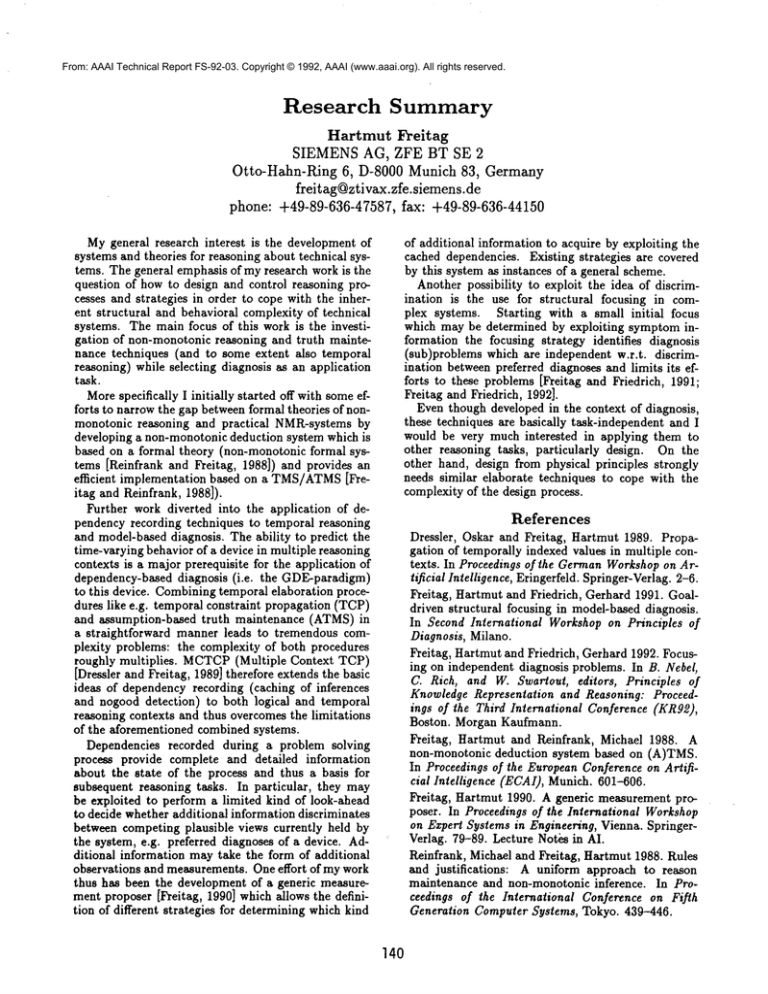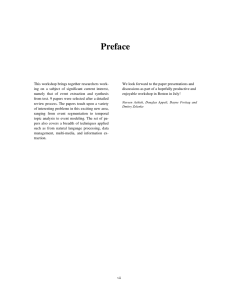
From: AAAI Technical Report FS-92-03. Copyright © 1992, AAAI (www.aaai.org). All rights reserved.
Research
Summary
Hartmut Freitag
SIEMENS AG, ZFE BT SE 2
Otto-Hahn-Ring6, D-8000Munich83, Germany
freitag@ztivax.zfe.siemens.de
phone:+49-89-636-47587,fax: +49-89-636-44150
Mygeneral research interest is the development of
systems and theories for reasoning about technical systems. The general emphasis of myresearch work is the
question of how to design and control reasoning processes and strategies in order to cope with the inherent structural and behavioral complexity of technical
systems. The main focus of this work is the investigation of non-monotonic reasoning and truth maintenance techniques (and to some extent also temporal
reasoning) while selecting diagnosis as an application
task.
Morespecifically I initially started off with someefforts to narrow the gap between formal theories of nonmonotonic reasoning and practical NMR-systems by
developing a non-monotonic deduction system which is
based on a formal theory (non-monotonic formal systems [Reinfrank and Freitag, 1988]) and provides an
efficient implementation based on a TMS/ATMS
[Freitag and Reinfrank, 1988]).
Further work diverted into the application of dependency recording techniques to temporal reasoning
and model-based diagnosis. The ability to predict the
time-varying behavior of a device in multiple reasoning
contexts is a major prerequisite for the application of
dependency-based diagnosis (i.e. the GDE-paradigm)
to this device. Combiningtemporal elaboration procedures like e.g. temporal constraint propagation (TCP)
and assumption-based truth maintenance (ATMS)
a straightforward
manner leads to tremendous complexity problems: the complexity of both procedures
roughly multiplies.
MCTCP(Multiple Context TCP)
[Dressier and Freitag, 1989] therefore extends the basic
ideas of dependency recording (caching of inferences
and nogood detection) to both logical and temporal
reasoning contexts and thus overcomes the limitations
of the aforementioned combined systems.
Dependencies recorded during a problem solving
process provide complete and detailed information
about the state of the process and thus a basis for
subsequent reasoning tasks. In particular,
they may
be exploited to perform a limited kind of look-ahead
to decide whether additional information discriminates
between competing plausible views currently held by
the system, e.g. preferred diagnoses of a device. Additional information may take the form of additional
observations and measurements. One effort of mywork
thus has been the development of a generic measurement proposer [Freitag, 1990] which allows the definition of different strategies for determining which kind
of additional information to acquire by exploiting the
cached dependencies. Existing strategies are covered
by this system as instances of a general scheme.
Another possibility to exploit the idea of discrimination is the use for structural focusing in complex systems. Starting with a small initial focus
which may be determined by exploiting symptom information the focusing strategy identifies diagnosis
(sub)problems which are independent w.r.t, discrimination between preferred diagnoses and limits its efforts to these problems [Freitag and Friedrich, 1991;
Freitag and Friedrich, 1992].
Even though developed in the context of diagnosis,
these techniques are basically task-independent and I
would be very much interested in applying them to
other reasoning tasks, particularly design. On the
other hand, design from physical principles strongly
needs similar elaborate techniques to cope with the
complexity of the design process.
References
Dressier, Oskar and Freitag, Hartmut 1989. Propagation of temporally indexed values in multiple contexts. In Proceedings of the GermanWorkshop on Artificial Intelligence, Eringerfeld. Springer-Verlag. 2-6.
Freitag, Hartmut and Friedrich, Gerhard 1991. Goaldriven structural focusing in model-based diagnosis.
In Second International Workshop on Principles of
Diagnosis, Milano.
Freitag, Hartmut and Friedrieh, Gerhard 1992. Focusing on independent diagnosis problems. In B. Nebel,
C. Rich, and W. Swarlout, editors, Principles of
Knowledge Representation and Reasoning: Proceedings of the Third International Conference (KR92),
Boston. Morgan Kaufmann.
Freitag, Hartmut and Reinfrank, Michael 1988. A
non-monotonic deduction system based on (A)TMS.
In Proceedings of the European Conference on Artificial Intelligence (ECA1}, Munich. 601-606.
Freitag, Hartmut 1990. A generic measurement proposer. In Proceedings of the International Workshop
on Expert Systems in Engineering, Vienna. SpringerVerlag. 79-89. Lecture Nots in AI.
Reinfrank, Michael and Freitag, Hartmut 1988. Rules
and justifications:
A uniform approach to reason
maintenance and non-monotonic inference. In Proceedings of the International Conference on Fifth
Generation Computer Systems, Tokyo. 439-446.
140





